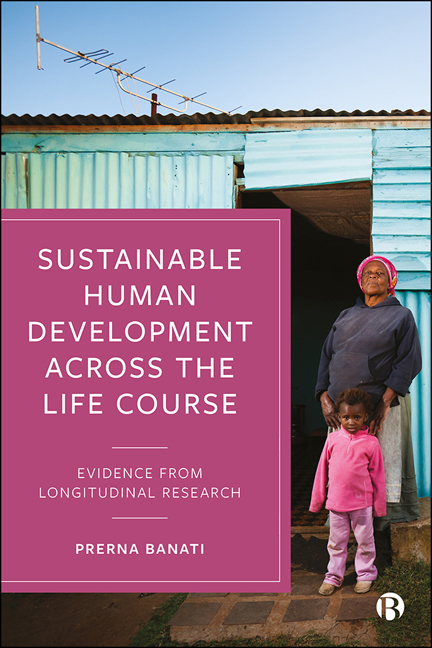Book contents
- Frontmatter
- Dedication
- Dedication
- Contents
- List of Figures, Tables and Boxes
- Notes on Contributors
- Foreword: Understanding and Enhancing Human Development Among Global Youth – On the Unique Value of Developmentally Oriented Longitudinal Research
- Introduction: Measuring Sustainable Human Development Across the Life Course
- 1 Exploring the Potential for Gender Norm Change in Adolescent Girls: Evidence from ‘Real Choices, Real Lives’ Longitudinal, Qualitative Study Data
- 2 Unequal Educational Trajectories: The Case of Ethiopia
- 3 Early Life Transitions Increase the Risk for HIV Infection: Using Latent Class Growth Models to Assess the Effect of Key Life Events on HIV Incidence Among Adolescent Girls in Rural South Africa
- 4 Achieving the Sustainable Development Goals: Evidence from the Longitudinal Parenting Across Cultures Project
- 5 Achieving Gender Equality: Understanding Gender Equality and Health Among Vulnerable Adolescents in the Sustainable Development Goals Era
- 6 Capturing the Complexities of Adolescent Transitions Through a Mixed Methods Longitudinal Research Design
- 7 Child Well-being Across the Life Course: What Do We Know, What Should We Know?
- 8 Mauritian Joint Child Health Project: A Multigenerational Family Study Emerging from a Prospective Birth Cohort Study: Initial Alcohol-related Outcomes in the Offspring Generation
- Conclusion: The Future of Longitudinal Research
- Index
Conclusion: The Future of Longitudinal Research
Published online by Cambridge University Press: 05 January 2022
- Frontmatter
- Dedication
- Dedication
- Contents
- List of Figures, Tables and Boxes
- Notes on Contributors
- Foreword: Understanding and Enhancing Human Development Among Global Youth – On the Unique Value of Developmentally Oriented Longitudinal Research
- Introduction: Measuring Sustainable Human Development Across the Life Course
- 1 Exploring the Potential for Gender Norm Change in Adolescent Girls: Evidence from ‘Real Choices, Real Lives’ Longitudinal, Qualitative Study Data
- 2 Unequal Educational Trajectories: The Case of Ethiopia
- 3 Early Life Transitions Increase the Risk for HIV Infection: Using Latent Class Growth Models to Assess the Effect of Key Life Events on HIV Incidence Among Adolescent Girls in Rural South Africa
- 4 Achieving the Sustainable Development Goals: Evidence from the Longitudinal Parenting Across Cultures Project
- 5 Achieving Gender Equality: Understanding Gender Equality and Health Among Vulnerable Adolescents in the Sustainable Development Goals Era
- 6 Capturing the Complexities of Adolescent Transitions Through a Mixed Methods Longitudinal Research Design
- 7 Child Well-being Across the Life Course: What Do We Know, What Should We Know?
- 8 Mauritian Joint Child Health Project: A Multigenerational Family Study Emerging from a Prospective Birth Cohort Study: Initial Alcohol-related Outcomes in the Offspring Generation
- Conclusion: The Future of Longitudinal Research
- Index
Summary
The landscape of longitudinal research today
This volume has presented examples of world class longitudinal research with policy and programme relevance. They join a growing number of researchers working with longitudinal data. In the last ten years, the number of publications citing use of longitudinal data has grown by 75%, shown in Figure 9.1. This growth presents an important resource for policy makers and practitioners towards meeting their sustainable development targets.
Despite the innovations presented, the potential relevance and impact, it is no doubt that longitudinal researchers today have experienced challenges in their dedication to this type of work.
To further unpack the landscape of longitudinal research, a systematic analysis of 122 longitudinal studies was conducted (Banati, 2019). A comprehensive search of the published literature was undertaken in Google Scholar, Pubmed and Scopus using the following search terms: birth cohort, longitudinal, child, life course and life stage. The study also drew from the largest open source database of longitudinal studies available – the Low and Middle Income Longitudinal Population Study Directory developed by the Institute for Fiscal Studies (2018). Inclusion criteria were (1) a minimum of two rounds of data collection; (2) first round conducted after 1970; (3) capturing information and responding to questions relevant for children. The studies are located in high-, middle- and low-income countries. Without a doubt, this was not an exhaustive process and may not have captured all available studies. Despite this, to our knowledge, we have identified and analysed the largest collection of longitudinal studies among children to date.
In addition, an online survey was created and shared with UNICEF's GLORI network members and additional investigators identified from the systematic analysis. GLORI – the Global Longitudinal Research Initiative – is a research network of longitudinal researchers working on topics relevant for children. It has 31 members working in 41 countries. The membership list can be found on the GLORI website (UNICEF, 2020). These were largely observational studies (61%). Most studies (63%) had more than five years of data collected, the average attrition rate was 19.8%.
Challenges experienced by longitudinal research today
The results of our examination of studies indicate that good longitudinal research is costly, and funding tends to be secured by wave and through multiple donors, with differing priorities. Only 13% of studies were identified as funded by national (governmental) entities, raising questions of sustainability.
- Type
- Chapter
- Information
- Sustainable Human Development across the Life CourseEvidence from Longitudinal Research, pp. 233 - 248Publisher: Bristol University PressPrint publication year: 2021



